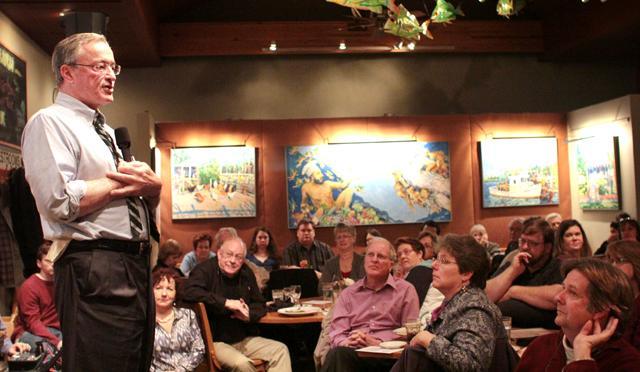If you ever wonder why your brain thinks the way it does, or question how it even knows to think, you are not alone. Dr. Thomas Gualtieri has followed his curiosity to find out how we biologically conceptualize love.
The North Carolina Museum of Natural Sciences hosts monthly Science Cafés . Last week, Gualtieri presented on the neuroscience of love. Katey Ahmann , Deputy Director of Education of the museum, said the Science Café is focusing on neuroscience this year.
“I think anything that tells you a little about how your body works is interesting to anybody at any age, especially your brain,” Ahmann said. “We’ve had cafés on sleep, we’ve had them on memory… anything that has to do with your brain is too mysterious, so people have to figure it out. It’s just a mystery.”
The concept of the Science Cafés is presents a comforting atmospher e through food and drink.
“It’s a unique way to talk about science because you’re comfortable; you’re not in an academic setting,” Ahmann said. “You’re sitting down and eating dinner, and it’s mostly set up as question and answer so you can ask the questions that are on your mind. That’s probably why it’s so popular. It’s social — you’re with your friends and you get to eat a meal.”
This month’s topic explained how love may just be a side effect of the dopamine reward centers of the brain. Gualtieri , the medical director of the North Carolina Neuropsychiatry Clinics and the author of several books and more than 100 scientific articles, brought his expertise to the science forum.
“I don’t necessarily know more about love than you do,” Gualtieri said. “I was just inspired after reading an article on related Alzheimer’s disease. That is, that if the spouse had Alzheimer’s, the other spouse is much more likely to have it as well.”
Dr. Gualtieri explained how DNA and biological forces shape our perceptions and reactions to our environment. Love is no exception.
“Why does A gets up with B and not C?” Gualtieri asked. “Well, it must be in the brain. What’s happening in the brain that makes people fall in love? After all, if it doesn’t happen in your brain and if it’s not in your DNA, then it really doesn’t happen.”
According to this explanation, love may be a chemical reaction as much as it is an emotion.
“You can show a picture of a loved one to the partner, and you’ll see activations of stimulation in the brain,” Gualtieri said. “Although, if you are eating a fabulous meal or watching a movie, your body will stimulate dopamine. Basically, having any pleasurable experience that’s a little out of the ordinary will stimulate dopamine.”
According to Gualtieri , it’s not too farfetched when you say, ‘I love this movie,’ or, ‘I love playing this game,’ because it affects the similar pathway in your brain that romance does.
Many from the crowd inquired whether humans had emotions or whether they were just vessels of chemical reactions. Gualtieri said he thinks the human race is a mix of both.
“Being a doctor and seeing patients every day, I never have any doubt that I exist, or that any of my patients exist,” Gualtieri said. “I think we’re bridging the gap between molecules and what we experience… but there is such a thing as unconditional love. We experience it all the time.”








